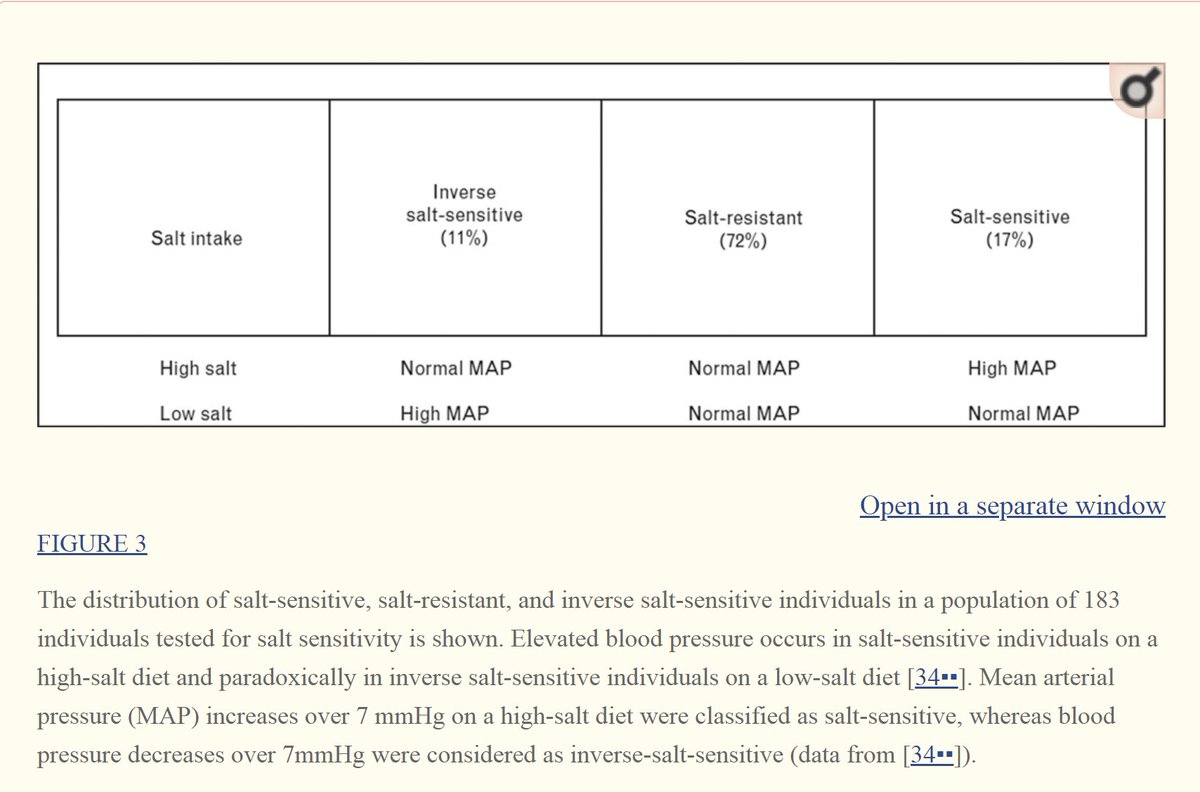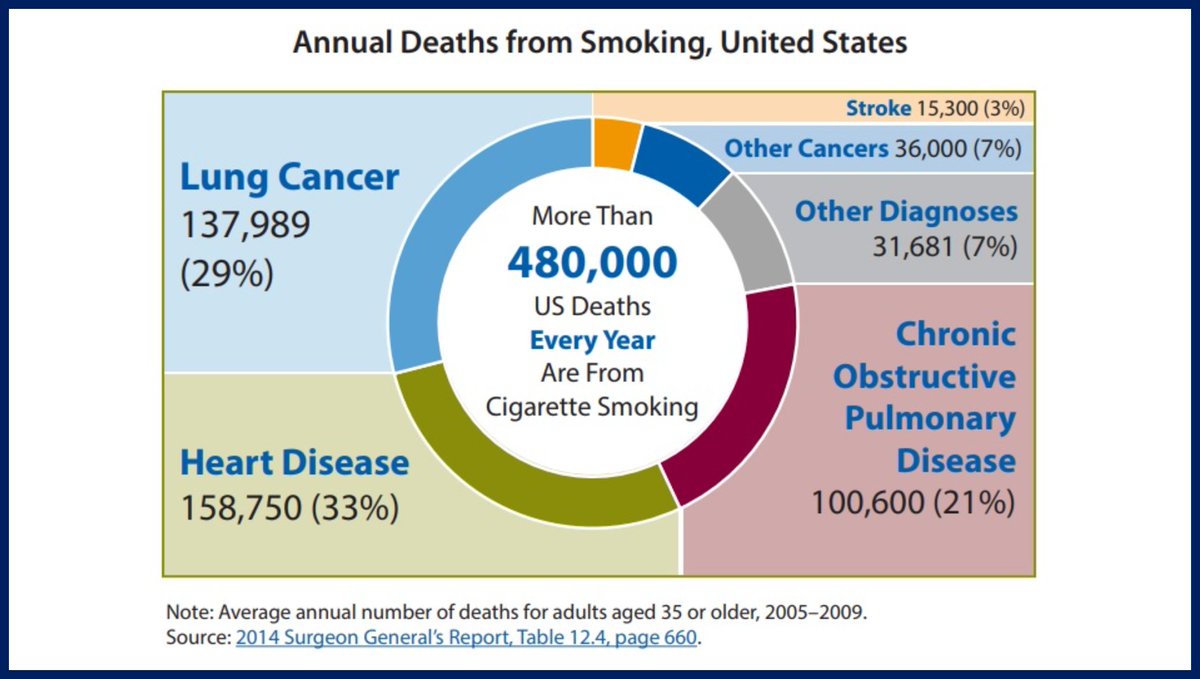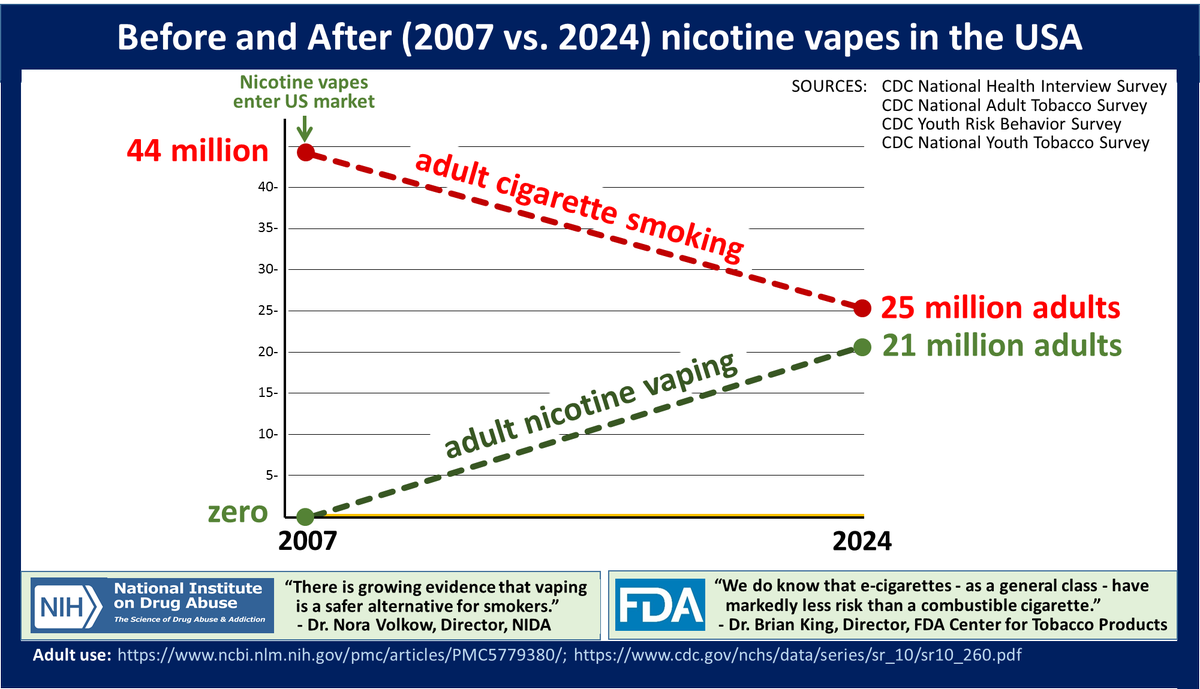Truth-telling and "utility" (greatest good for greatest number) are 2 basic principles in healthcare ethics that may come into conflict. For example:
17% of adults are salt-sensitive (more salt => higher blood pressure). 83% can eat as much salt as they like.
THREAD
17% of adults are salt-sensitive (more salt => higher blood pressure). 83% can eat as much salt as they like.
THREAD

(2)
The above figure comes from this peer-reviewed paper.
ncbi.nlm.nih.gov/pmc/articles/P…
Now, let's consider how truth-telling and utility come into conflict...
The above figure comes from this peer-reviewed paper.
ncbi.nlm.nih.gov/pmc/articles/P…
Now, let's consider how truth-telling and utility come into conflict...
(3)
The dilemma for public health is this: If we tell EVERYONE to reduce their salt intake, this will help the 17% who are salt-sensitive. It may save lives.
But that requires us to violate truth-telling (i.e., it requires public health authorities to lie to 83% of adults).
The dilemma for public health is this: If we tell EVERYONE to reduce their salt intake, this will help the 17% who are salt-sensitive. It may save lives.
But that requires us to violate truth-telling (i.e., it requires public health authorities to lie to 83% of adults).
(4)
Unfortunately, there is no simple diagnostic to distinguish the 17% who are salt-sensitive from 83% who are not.
If you have a family history of high BP, or have high BP yourself, best to reduce your salt intake.
Telling EVERYONE to do so, reduces pleasure, and...
Unfortunately, there is no simple diagnostic to distinguish the 17% who are salt-sensitive from 83% who are not.
If you have a family history of high BP, or have high BP yourself, best to reduce your salt intake.
Telling EVERYONE to do so, reduces pleasure, and...
(5)
...and may actually harm the 11% who are "inverse salt-sensitive." For THEM, lowering salt intake may increase blood pressure. The public health dilemma thickens...
SO: How often have you seen or heard public health recommendations to lower your salt intake?



...and may actually harm the 11% who are "inverse salt-sensitive." For THEM, lowering salt intake may increase blood pressure. The public health dilemma thickens...
SO: How often have you seen or heard public health recommendations to lower your salt intake?




(6)
Clearly, some people in public health are happy to lean into this paternalistic white lie. It promotes the greatest good for the greatest number. I mean, death is far worse than the loss of pleasure from salt for the 83% who don't benefit from this message. Right?
Clearly, some people in public health are happy to lean into this paternalistic white lie. It promotes the greatest good for the greatest number. I mean, death is far worse than the loss of pleasure from salt for the 83% who don't benefit from this message. Right?
(7)
Which of course brings us to health messages from old-school tobacco control authorities. Demonizing nicotine, like demonizing salt, is one of their key tactics. The words "nicotine" and "tobacco" and "smoking" are often used interchangeably.



Which of course brings us to health messages from old-school tobacco control authorities. Demonizing nicotine, like demonizing salt, is one of their key tactics. The words "nicotine" and "tobacco" and "smoking" are often used interchangeably.




(8)
As with demonizing psilocybin, the demonization of nicotine has slowed (and repressed attention to) research on #TherapeuticNicotine benefits.
It's out there, but when 80% of physicians still think nicotine causes cancer, this truth-telling ain't gonna happen any time soon.
As with demonizing psilocybin, the demonization of nicotine has slowed (and repressed attention to) research on #TherapeuticNicotine benefits.
It's out there, but when 80% of physicians still think nicotine causes cancer, this truth-telling ain't gonna happen any time soon.

(9)
11% of the population may actually experience health harms (higher blood pressure) from the demonization of salt.
The >10% of the adult population with #neurodiversity issues may be harmed by the demonization of nicotine.
As with salt, these harms are ignored. So far.
11% of the population may actually experience health harms (higher blood pressure) from the demonization of salt.
The >10% of the adult population with #neurodiversity issues may be harmed by the demonization of nicotine.
As with salt, these harms are ignored. So far.

(10)
Ignoring the harms that result from nicotine's demonization (e.g., fewer smokers use #SaferNicotine patches & gum to quit; fewer adults with #neurodiversity issues benefit from safer nicotine) violates ALL basic priniciples in healthcare ethics.
Ignoring the harms that result from nicotine's demonization (e.g., fewer smokers use #SaferNicotine patches & gum to quit; fewer adults with #neurodiversity issues benefit from safer nicotine) violates ALL basic priniciples in healthcare ethics.

(11)
A similar paternalistic utilitarian lie surrounds "tobacco." Without a shadow of doubt, switching from smoking to smokeless tobacco lowers your risk of cancer, heart and lung disease dramatically. However, as with salt, public health insists "there is no safe tobacco."



A similar paternalistic utilitarian lie surrounds "tobacco." Without a shadow of doubt, switching from smoking to smokeless tobacco lowers your risk of cancer, heart and lung disease dramatically. However, as with salt, public health insists "there is no safe tobacco."




(12)
The claim, "there is no safe tobacco" is technically true, but also a wild lie-by-omission-of-context.
Withholding truth about relative risks is a violation of truth-telling (a basic moral principle in healthcare ethics, linked to informed consent and autonomy).
The claim, "there is no safe tobacco" is technically true, but also a wild lie-by-omission-of-context.
Withholding truth about relative risks is a violation of truth-telling (a basic moral principle in healthcare ethics, linked to informed consent and autonomy).

(13)
So... Here we are:
Public health authorities have grown increasingly comfortable with policies & public messages that violate one of the key moral principles of healthcare ethics: truth-telling.
PROBLEM: When you're caught violating the truth, you lose public trust.
So... Here we are:
Public health authorities have grown increasingly comfortable with policies & public messages that violate one of the key moral principles of healthcare ethics: truth-telling.
PROBLEM: When you're caught violating the truth, you lose public trust.

• • •
Missing some Tweet in this thread? You can try to
force a refresh





















